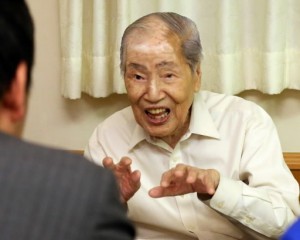Special Report: President Obama to visit Hiroshima, Part 1
May 11, 2016
Long-awaited decision for A-bomb survivors
by Kyosuke Mizukawa, Staff Writer
The United States, which dropped the atomic bomb above the people of Hiroshima on August 6, 1945, still reigns as a nuclear superpower. In this special series, the Chugoku Shimbun will explore the significance and impact of President Barack Obama’s visit to the A-bombed city as the first sitting U.S. president.
On the evening of May 10, when the official announcement on U.S. President Barack Obama’s visit to Hiroshima was first reported, Sunao Tsuboi, 91, responded to questions from the press, who flocked to his home in Nishi Ward, Hiroshima. Mr. Tsuboi, an A-bomb survivor, is chair of the Hiroshima Prefectural Confederation of A-bomb Sufferers Organizations.
In elated tones, Mr. Tsuboi said, “I’m very glad that President Obama has finally made up his mind. I didn’t expect him to come to Hiroshima in my lifetime.”
In January 2009, when Mr. Obama became the American president, seven groups of A-bomb survivors in Hiroshima, including the two Hiroshima Prefectural Confederation of A-bomb Sufferers Organizations, wrote a joint letter that was delivered to the White House, calling on Mr. Obama to come to Hiroshima. Seven years and four months later, the president’s visit to this city was finally confirmed. It was an outcome that the A-bomb survivors had been awaiting for some time.
“I once felt bitterness and anger.”
In the 2008 presidential race, Mr. Obama pledged to pursue a world free of nuclear weapons. According to the Stockholm International Peace Research Institute, the United States was holding about 7,000 nuclear weapons as of January 2015. The president of the United States also serves as commander-in-chief of the U.S. military, which continues to maintain this enormous nuclear arsenal. The A-bomb survivors have long held the powerful wish that the president of the United States visit Hiroshima in person, see the devastating reality of the atomic bombing first-hand, and take strong action to advance the elimination of nuclear arms.
After World War II, a series of U.S. presidents repeatedly pursued nuclear tests and sought to strengthen that nation’s nuclear arsenal, both in size and capability, during the Cold War era with the former Soviet Union. Every time a nuclear test has been conducted, A-bomb survivors gather for a sit-in in front of the Cenotaph for the A-bomb Victims in the Hiroshima Peace Memorial Park to protest. For the participants of these protest activities, the president of the United States has been a prime target.
Thus, when President Obama spoke in Prague in April 2009 and referred to the “moral responsibility” of the United States, as the only nation to have used a nuclear weapon, to act so that these weapons can be eliminated, his words moved Mr. Tsuboi’s heart. “My body was terribly burned in the bombing,” he said. “I once felt bitterness and anger toward the United States, even thinking I would seek revenge someday. I never expected to praise the president of the nation that dropped the atomic bombs.”
“Restore things as they were.” This phrase was frequently used by the late Heiichi Fujii (1915-1996), the first secretary general of the Japan Confederation of A- and H-Bomb Sufferers Organizations (Nihon Hidankyo), who spearheaded the campaign to seek relief measures for A-bomb survivors during his lifetime. When Nihon Hidankyo issued the key principles for its activities in 1984, the group asked the United States to present a formal apology to the A-bomb survivors by acknowledging that dropping the atomic bombs was an act that harmed all of humanity and taking the initiative in efforts to abolish nuclear arms.
President Obama should be “resolutely prepared”
A welcoming mood for the president’s visit is spreading through the city. At the same time, the voice of the survivors, saying “Restore things as they were,” is still keenly heard.
Yoshihiko Yagi, 82, an A-bomb survivor and resident of Asaminami Ward, said, “The atomic bomb deprived innocent people of their right to live and their dignity. If President Obama avoids speaking squarely about the inhumanity of nuclear arms and instead argues the point of view of a nuclear power, the dead whose names lie beneath the cenotaph will be even more bitterly disappointed.”
Five members of Mr. Yagi’s family, including his father and his siblings, were killed in the atomic bombing. Their remains were never found. He believes they were buried within the Atomic Bomb Memorial Mound located in the Peace Memorial Park. The mound holds the remains of 70,000 A-bomb victims whose identities are unknown.
Mr. Yagi added, “The survivors and citizens who are alive today won’t be the only ones listening to the president’s words. Scores of A-bomb victims will be listening, too. So, I think he should come to Hiroshima, resolutely prepared, and talk about his determination to advance the abolition of nuclear weapons.”
(Originally published on May 11, 2016)








